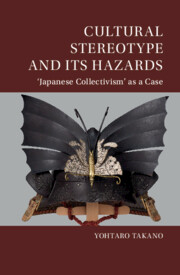
- Publisher:
- Cambridge University Press
- Online publication date:
- November 2024
- Print publication year:
- 2024
- Online ISBN:
- 9781108973625

Although it is widely believed that Japanese people are typical collectivists compared to individualistic Westerners, this view is not supported by empirical research. Employing 'Japanese collectivism' as a case example, this book explores how the dichotomous view of cultures was established and investigates how cultural stereotypes exacerbate emotional conflicts between human groups. Drawing on empirical findings, it theoretically analyses the properties of cultural stereotype to reveal the hazards associated with stereotyping nations or ethnicities. Students and researchers from numerous disciplines, including psychology, anthropology, sociology, political science, and economics, will gain fresh insights from this reconceptualization of culture.
‘In this wide-ranging work of psychological and historical scholarship, Professor Takano offers a compelling critique of the widely held stereotype of Japanese culture as ‘collectivist.’ This is an important book for its disturbing analysis of the consequences of misleading stereotypes not just about Japan, but around the world.’
David Funder - Distinguished Professor of Psychology, University of California, Riverside, USA, and the author of The Personality Puzzle
‘This book is particularly enlightening in revealing, from a variety of perspectives, that the common view of ‘Japanese collectivism’ is nothing but a myth entertained by many people in Japan and abroad. People see what they want to see. Professor Takano warns us how hazardous cultural stereotypes can be.’
Yukio Hirose - Professor Emeritus of Linguistics, University of Tsukuba, Japan
‘This engaging book should completely revise your understanding of Individualism-collectivism (I/C). Focusing on the most common East-West comparison in cross-cultural psychology, Professor Takano reports that, contrary to the common belief, Japanese and North American beliefs and behaviors do not differ on a host of I/C variables. He then surveys anthropology, business, economics, and history for clues as to how the common belief that they do differ originated and persists. A wealth of narrative evidence and key psychological ideas support his case. He then describes the damage that this and other stereotypes have caused. This provocative and wide-ranging book is essential reading for anyone interested in stereotyping and culture.’
James S. Uleman - Professor of Psychology, New York University, USA
‘This volume is a compelling and insightful critique of the stereotypes and ideologies that Japanese people are collectivistic, homogeneous, and interdependent. The author clearly demonstrates the theoretical and methodological weaknesses associated with these outdated views. This thought-provoking volume represents impeccable scholarship and should be read by all interested in conceptions of culture and modern Japan.’
Per F. Gjerde - Professor Emeritus of Psychology, University of California, Santa Cruz, USA
 Loading metrics...
Loading metrics...
* Views captured on Cambridge Core between #date#. This data will be updated every 24 hours.
Usage data cannot currently be displayed.